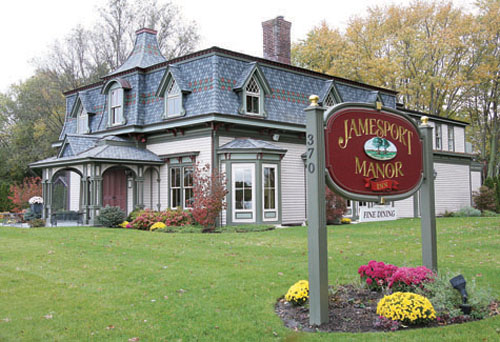No special permit yet for Jamesport Manor Inn

The owners of Jamesport Manor Inn on Thursday morning attempted to convince the Riverhead Town Board to end the 10-year litigation between the two sides and give them a special permit to build a 4,200 square foot barn in the back of the property, as well as a 1,200 square foot tent near the road for catering events.
But it doesn’t appear the town council appears open to granting the permit.
Jamesport Manor Inn co-owner Frank McVeigh said he expects to lose about $81,000 this year on the restaurant, an historic structure that was rebuilt several years ago after it was destroyed by fire. Mr. McVeigh said the restaurant use alone isn’t enough to sustain the business financially.
Under the town code, a use that pre-existed zoning and doesn’t conform to its current zoning can be expanded if the Town Board grants a special permit to do so. Special permit applications require public hearings.
However, Town Board members balked at the idea, since they say the expansion is bigger than what’s there now.
The Jamesport Manor Inn restaurant is 2,930 square feet and has 80 seats. The barn being proposed would be 4,200 square feet and would have 150 seats, which is down from the 182 seats proposed back in 2008.
The property, on the east side of Manor Road in Jamesport, is 3.8 acres.
Supervisor Sean Walter says he doesn’t think the Town Board has ever granted an expansion of a non-conforming use that was more than 100 percent.
“I am not about to set a precedent,” he told Mr. McVeigh.
The Inn, which is more than 250 years old, had sat unused for several years before Mr. McVeigh and co-owner Matt Kar undertook a plan to restore it. That plan was set back by the 2005 fire, after which they built a new structure to resemble the historic building.
The owners had made this same proposal in 2008 and were rejected by the town Zoning Board of Appeals in 2009 on an application seeking an interpretation as to whether the proposed catering use was an extension of the restaurant, and could be granted by special permit. But the ZBA denied the application on the grounds that it felt the owners failed to post a hearing notice properly so they could get an adjournment, rather than on the question before it.
The case went to court and a state supreme court judge in 2010 ordered the town to process the application. But a state appellate court later overruled the state supreme court and said the whole case had to go back to state supreme court, which is where it is currently.
Mr. McVeigh and Ms. Margolin made their case to the Town Board to just make the application for a special permit and eliminate the need for the courts or the ZBA.
But the discussion ended with no clear verdict.
Asked afterward what the conclusion of the half-hour long discussion was, Mr. Walter replied, “I don’t think there was one.”








